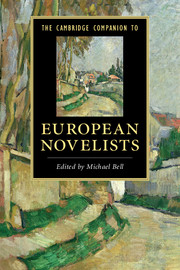Book contents
- Frontmatter
- Introduction: The novel in Europe 1600–1900
- 1 Miguel de Cervantes (1547–1616): Don Quixote: romance and picaresque
- 2 Daniel Defoe (1660–1731): Journalism, myth and verisimilitude
- 3 Samuel Richardson (1689–1761): The epistolary novel
- 4 Henry Fielding (1707–1754): The comic epic in prose
- 5 Jean-Jacques Rousseau (1712–1778): The novel of sensibility
- 6 Laurence Sterne (1713–1768): The fiction of sentiment
- 7 Johann Wolfgang von Goethe (1749–1832): The German Bildungsroman
- 8 Walter Scott (1771–1832): The historical novel
- 9 Stendhal (1783–1842): Romantic irony
- 10 Mary Shelley (1797–1851): The Gothic novel
- 11 Honoré de Balzac (1799–1850): ‘Realism’ and authority
- 12 Charles Dickens (1812–1870): Englishman and European
- 13 George Eliot (1819–1880): Reality and sympathy
- 14 Gustave Flaubert (1821–1880): Realism and aestheticism
- 15 Fyodor Dostoevsky (1821–1881): ‘Fantastic realism’
- 16 Leo Tolstoy (1828–1910): Art and truth
- 17 Émile Zola (1840–1902): Naturalism
- 18 Henry James (1843–1916): Henry James's Europe
- 19 Marcel Proust (1871–1922): A modernist novel of time
- 20 Thomas Mann (1875–1955): Modernism and ideas
- 21 James Joyce (1882–1941): Modernism and language
- 22 Virginia Woolf (1882–1941): Re-forming the novel
- 23 Samuel Beckett (1906–1989): Language, narrative, authority
- 24 Milan Kundera (1929–): The idea of the novel
- Conclusion: The European novel after 1900
- Further reading
- Index
- Cambridge Companions To …
23 - Samuel Beckett (1906–1989): Language, narrative, authority
Published online by Cambridge University Press: 28 September 2012
- Frontmatter
- Introduction: The novel in Europe 1600–1900
- 1 Miguel de Cervantes (1547–1616): Don Quixote: romance and picaresque
- 2 Daniel Defoe (1660–1731): Journalism, myth and verisimilitude
- 3 Samuel Richardson (1689–1761): The epistolary novel
- 4 Henry Fielding (1707–1754): The comic epic in prose
- 5 Jean-Jacques Rousseau (1712–1778): The novel of sensibility
- 6 Laurence Sterne (1713–1768): The fiction of sentiment
- 7 Johann Wolfgang von Goethe (1749–1832): The German Bildungsroman
- 8 Walter Scott (1771–1832): The historical novel
- 9 Stendhal (1783–1842): Romantic irony
- 10 Mary Shelley (1797–1851): The Gothic novel
- 11 Honoré de Balzac (1799–1850): ‘Realism’ and authority
- 12 Charles Dickens (1812–1870): Englishman and European
- 13 George Eliot (1819–1880): Reality and sympathy
- 14 Gustave Flaubert (1821–1880): Realism and aestheticism
- 15 Fyodor Dostoevsky (1821–1881): ‘Fantastic realism’
- 16 Leo Tolstoy (1828–1910): Art and truth
- 17 Émile Zola (1840–1902): Naturalism
- 18 Henry James (1843–1916): Henry James's Europe
- 19 Marcel Proust (1871–1922): A modernist novel of time
- 20 Thomas Mann (1875–1955): Modernism and ideas
- 21 James Joyce (1882–1941): Modernism and language
- 22 Virginia Woolf (1882–1941): Re-forming the novel
- 23 Samuel Beckett (1906–1989): Language, narrative, authority
- 24 Milan Kundera (1929–): The idea of the novel
- Conclusion: The European novel after 1900
- Further reading
- Index
- Cambridge Companions To …
Summary
Late in 1950, in a Paris café opposite the premises of a recently relaunched, once clandestine publishing house in the rue Bernard-Palissy, a forty-four-year-old expatriate Irishman, the author of a modest body of work published in English more than a decade earlier, sat together with his partner considering the typescript of the three novels he had completed in his adoptive French during the previous two-and-a-half years. This was not the first time that the pair had sought a publisher. There had been, it seems, dozens of fruitless attempts already. Spirits were accordingly at a low ebb, and money was tight. As the two discussed the dwindling prospects of success, the writer is said to have turned to his companion, partly in jest but more likely in desperation, to deliver the following glum verdict: ‘If they publish it this time, I'll treat you to a pack of cigarettes. But promise me you won't try again.’
Some nineteen years later, in the autumn of 1969, the scene was very different. To the same protagonists, Samuel Beckett and Suzanne Deschevaux-Dumesnil, now married, and on holiday in Tunisia at the time, came a telegram bearing unexpected, even perturbing news: Beckett had just been awarded the 1969 Nobel Prize for Literature. The change in fortune could not have been more dramatic. At the award ceremony later that year, the poet, critic and dramatist Karl Ragnar Gierow explained the Swedish Academy's decision. Beckett’s work of the late 1940s, he argued, notably the trilogy of novels written in French that had proved so hard to place only twenty years before (Molloy, Malone meurt and L’Innommable), together with the play En attendant Godot, first performed amid controversy in 1953, was grounded in an experience of the Second World War.
- Type
- Chapter
- Information
- The Cambridge Companion to European Novelists , pp. 394 - 409Publisher: Cambridge University PressPrint publication year: 2012

